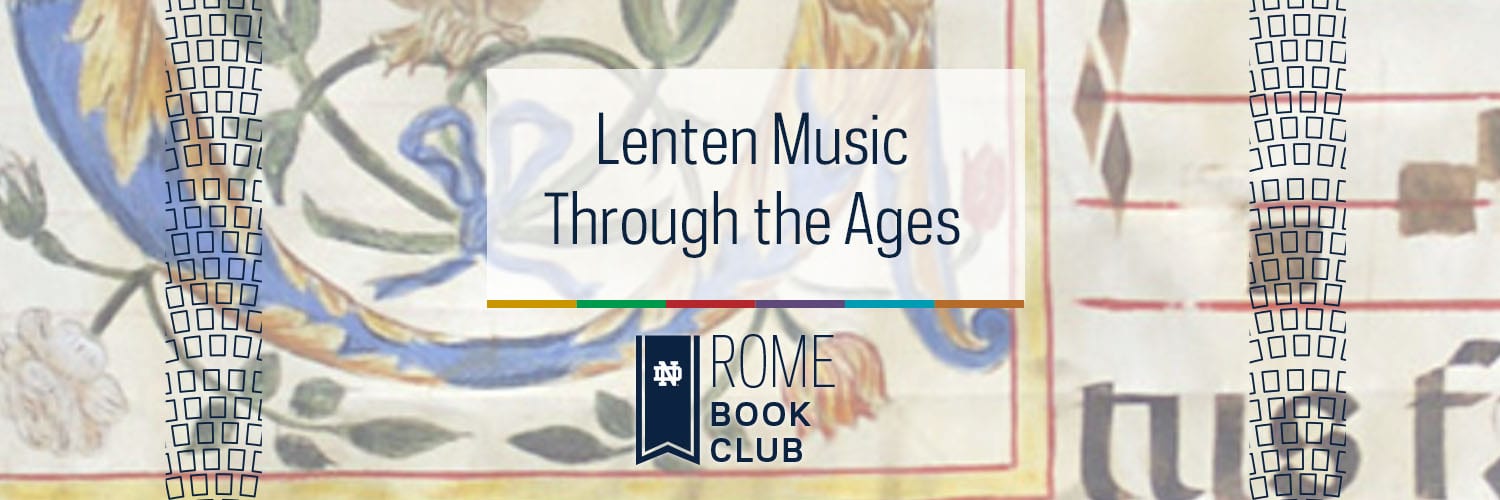Week 1 - Praying With One Voice: Gregorian Chant

We’ll start our learning journey through Lenten music with Gregorian Chant — this is the earliest music of the Church. We don’t really know exactly what this music sounded like, but we know that song was a part of culture. What we have now are fossils, the remains of a musical culture. In reality, music develops through practice, by people who are trained in a discipline and develop music for specific events.
Meet the Faculty
Presented by J.J. Wright

J.J. Wright ’14 M.S.M., ’17 D.M.A. is currently the Director of the Notre Dame Folk Choir. During his graduate studies at Notre Dame, J.J. lived in Rome where he researched and wrote his dissertation on early Baroque oratorio and jazz in collaboration with the Rome Global Gateway. In addition, he studied at the Pontifical Institute of Sacred Music and interned with the Sistine Chapel Choir.
text
text
Getting started - A brief introduction to Gregorian Chant
Presented by J.J. Wright
In this video, we’ll talk through the early development of Gregorian Chant and the way cathedral and monastery traditions were synthesized into a common repertoire of sung prayer.
Gregorian Chant
Presented by J.J. Wright
Gregorian Chant is beautiful music, and there’s a lot of it.
Even after the Second Vatican Council, multiple church documents and Popes have said it deserves “pride of place” in our liturgies.
It’s important to understand that Gregorian chant, like music in every style, is a living tradition. Even to this day, scholars do extensive research on historical performance practice, the Vatican continues to release chant books, and arguments about whether or not to sing Gregorian Chant at the liturgy more closely resemble modern political discourse rather than a Church navigating the waters of preserving an invaluable tradition in a changing world.
The earliest chant sung in Rome is called Old Roman Chant. In the 7th-11th centuries, this was primarily an oral tradition, cultivated by professional musical groups like the papal Schola Cantorum, the earliest predecessor to the modern day Sistine Chapel Choir. After the 11th century, Old Roman Chant started to go out of style and Gregorian Chant was largely adopted as the primary musical repertory in Rome.
The sound and shape of Gregorian Chant can help to form our understanding of what it means to pray as a community. As prayer in song, Gregorian Chant lays bare all complexity in favor of a single melody, arranged so as to bring alive every syllable. Our prayer becomes a desperate plea, acted out in song — a ritualized practice through which we can call upon God with one voice to grant our prayer. How desperately needed is this right now?
Gregorian Chant tells us something important about the tradition that we are a part of — over the course of more than a thousand years, we have continually cultivated our prayer in and through the richness of song. These songs ground us as a community, one that can share in delight and despair and bring our faith to life.
Listening Example 1
Presented by J.J. Wright
The text for Christus Factus Est (literally “Christ is made for us”) is taken from St. Paul’s Letter Epistle to the Philippians and is sung during the liturgies of the paschal triduum. Read the text before you listen and try to follow along while the recording plays — notice the areas where the melody accentuates the feeling in the text.
Christus factus est pro nobis obediens
usque ad mortem, mortem autem crucis.
Propter quod et Deus exaltavit illum et dedit illi nomen,
quod est super omne nomen.
Christ became obedient for us unto death,
even to the death, death on the cross.
Therefore God exalted Him and gave Him a name
which is above all names.
Listening Example 2
Presented by J.J. Wright
Improperium (literally “taunt” or “reproach”) is sung during the Mass on Palm Sunday. The text is taken from Psalm 68. Meditate on the words while you listen:
Improperium expectavit cor meum and miseriam
and sustinui which simul mecum contristaretur et non fuit.;
consolantem me quæsivi and non inveni.
and dederunt in escam meam fel,
and in siti mea potaverunt me aceto.
My heart expected reproach and misery
and I desired one who would grieve with me and there was none:
I sought one to console me, and I found none:
and they gave me gall as my food,
and in my thirst they gave me vinegar to drink.
The Origins of Gregorian Chant
Presented by J.J. Wright
Watch interviews with scholars from Catholic University on the origins of Gregorian Chant.
View the Event
Presented by J.J. Wright
Subscribe to the ThinkND podcast on Apple, Spotify, or Google.
Featured Speakers:
- J.J. Wright ’14, Director, Notre Dame Folk Choir.
- Professor Peter Jeffery, Michael P. Grace Chair in Medieval Studies and Professor of Musicology and Ethnomusicology, University of Notre Dame
